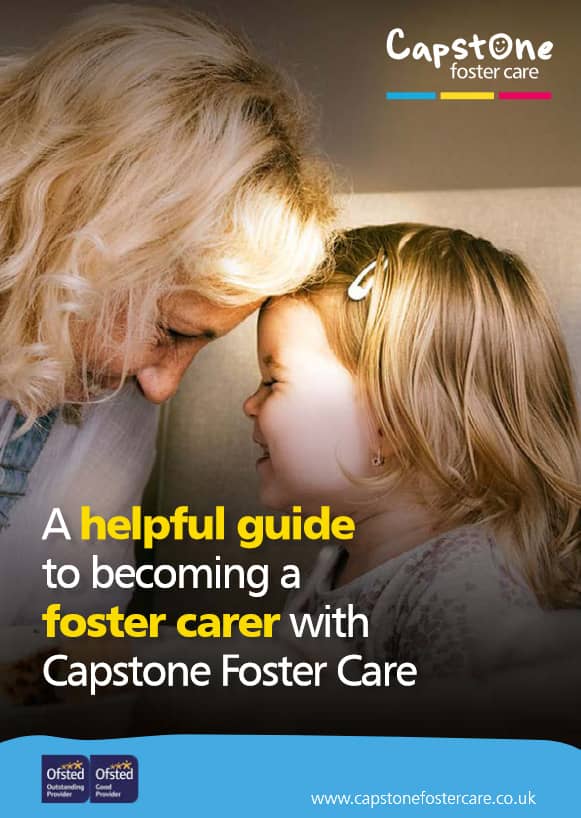


Fostering a disabled child
The role of an independent fostering agency
How to choose a foster care agency
Can I choose who I foster?
What are the benefits of fostering with an independent fostering agency?
What happens when a child is taken into care?
Fostering process: what happens on an initial home visit?
Fostering with local authority vs independent agency
A complete guide to becoming a foster carer
How Are Children in Foster Care Matched with Carers?
Foster Care Budgeting Tips
Becoming A Foster Carer
What is a Care Leaver?
What is a Foster Carer?
Fostering Regulations
How long does it take to become a Foster Carer?
What are the Foster Care requirements?
Changing IFA - Transferring to Capstone
8 reasons why a child may be taken into care
Fostering as a Career
Can you foster if you smoke or vape?
A guide to fostering assessments
LGBTQ+ Fostering
Equality, Inclusion & Anti-discriminatory Practice in Foster Care
What can disqualify you from foster care?
Can you foster if you’re on benefits?
Top transferable job skills to become a foster carer
Fostering as a same sex couple
Fostering while renting
Can you foster if you have mental health issues?
Is there an age limit for fostering in the UK?
Do foster carers get a pension?
How to foster a child: A step by step guide
How do DBS Checks Work?
Can I foster if...?
Mythbusting the top 10 Foster Care Myths
Can I foster if I am disabled?
LGBT Fostering Mythbusting
Can I foster if I have pets?
Can I Foster A Child?
Can I Foster and Work?
Can you Foster with a Criminal Record
Can Single People Foster?
LGBT Family and Foster Care
Fostering across Cultures
Muslim Fostering
Christian Foster Care
Sikh Fostering
Empty Nest Syndrome and Foster Care
Can I Foster?
What is the difference between residential care and foster care?
Fostering Babies and Young Children
What is Kinship Care?
Fostering Babies - Myths
Focusing on Parent & Child Fostering
Fostering Siblings
Fostering Teenagers
Fostering Teenagers - Breaking down the Myths
Fostering Unaccompanied and Asylum Seeking Children
Mother and Baby Foster Placements
Private Fostering
How does therapeutic fostering work?
Young Children Fostering Placements
Difference between short and long-term fostering
Types of self-harm
A Guide to the Foster Care Handbook
Reunification and Birth Parents: A Guide for Foster Carers
What is an EHC Plan? A Guide for Foster Carers
How to prepare a child for becoming a care leaver
Children who foster: impact of fostering on birth children
Fostering LGBTQ+ Youth
How to prepare your home for a foster child
How to help a lonely child: A Guide for Foster Carers
What are the National Minimum Standards for Fostering Services?
10 tips for foster children's education
How to prepare your foster child for secondary school
Tips for coping when foster placements end
Tips for foster parents during Coronavirus
What happens if foster parents get divorced?
5 ways to manage Mother's Day with foster children
Tips for managing foster children's bedtime routines
How to handle foster child bullying
Fostering allowances and the gender pay gap
What discounts can foster carers get?
How to adopt from Foster Care
5 ways to manage Father's Day for children in foster care
8 most common fostering challenges
FosterTalk Membership with Capstone Foster Care
Supporting foster children's contact with birth families
A guide to independent fostering
Keeping Children Safe Online: A Guide For Foster Carers
Movies About Foster Care
Play-based learning strategies for foster carers
A Guide to the Staying Put Program
Why Foster Parent Wellbeing Matters
How to deal with empty nest syndrome
How to recognise signs of depression in foster children
Can you take a foster child on holiday?
Tips and advice on fostering with a disability
10 tips on connecting with your Foster Child
Fostering vs Adoption - What's the difference?
How Fostering can change a future
How to adopt from Foster Care
How to encourage children to read in Foster Care
How to prepare a Foster Child's bedroom
Reading and Storytelling with Babies and Young Children
Supporting Children's Learning
The 20 most recommended books Foster Carers and young people should read
Things you can do when your children leave home
The impact of early childhood traumas on adolescence and adulthood
Anxious Disorders in Foster Children
What is sexual abuse and sexual violence
Foster Child behaviour management strategies
Foster Parent Advice: What to expect in your first year of fostering
Capstone's twelve tips at Christmas
10 celebrities who grew up in Foster Care
Could Millenials be the solution to the Foster Care crisis?
Do you work in Emergency Services?
Form F Assessor and Assessment Training
Foster Care Fortnight
Improving Children's Welfare - Celebrating Universal Children's Day
New Year - New Career - Become a Foster Carer
Young People Charities
Mother’s Day can be a tricky time for many children in foster care. This is because it’s common for them to have experienced some sense of loss or abandonment during their lives. In some cases, their mother or parents may have died, or have serious illnesses so they cannot take care of the child anymore. However, in other cases, the mother or parents may have abandoned the child, or are simply unable to take care of them any longer.
Whatever the reason, it’s likely the foster child will be suffering with the loss of their mother in their life on Mother’s Day – as this day will serve as a reminder, which can make them feel sad, or even dread the day approaching. That’s why we’ve put together this informative guide highlighting the ways to help foster children cope on Mother’s Day.
As each foster child is different, based on their different experiences growing up, it’s likely that some foster children may be very indifferent towards Mother’s Day – whereas some can see it as a painful reminder of the mother that they no longer have.
In order to evaluate how the day should proceed, and how to respond to the child’s feelings, it’s important to have a conversation with the child about their thoughts regarding the day. You could ask them what they have done in the past to celebrate the occasion, and how they are feeling for the upcoming day. You can then use this information to plan how to manage the day to be as painless as possible for them.
If the child responds to the above with a clear sense of loss and pain, it’s important to acknowledge this and address it head on. By encouraging the child to be open about their feelings, this will allow them to feel safe that they can display this emotion on the day – and reassure them that it’s a completely normal and natural reaction to think of their mother on this day.
If their mother is no longer with them, whether that means she has died or is unable to look after her child, you can ask them if they’d like to honour their birthmother on this day by lighting a candle, or saying a prayer.
During this time, the heightened emotions may cause your foster child to become distracted, or potentially exhibit anger. It’s important that the adult role models in their life – such as teachers, dancing teachers, football coaches etc. – know about the upcoming celebration, and how it might affect your child. For teachers specifically, this will allow them to modify the work set (for example, creating Mother’s Day cards) to also account for children who are no longer with their biological mothers.
Again, dependent on how they value the day, it’s important to consider how involved the foster child would want to be in the celebrations. If you have biological children already, it’s likely they’ll be teaming up, or working alongside Dad, to help organise something special for Mother’s Day. As a foster parent, regardless of whether you are the mother or father, it’s important to communicate to your biological children to involve your foster child. This is an important part of inclusion and feeling accepted into the family, and ensure they are treated in the same way the biological children are when giving gifts or making breakfast in bed.
However, if your foster child refuses to join in, it may be because this is too painful for them – and they want to deal with this pain in their own way, so it’s important that you don’t force them to join in if they would rather not.
Perhaps most importantly, remember that however you and your foster child decide to celebrate Mother’s Day, there’s no right or wrong way. It’s likely to be led by your foster child’s feelings and emotions towards the day, so keep lines of communication open and ensure your child feelings safe and secure enough to express their emotions on the day.
And, of course, if you ever need any fostering support during how to handle this tricky time, our team are on hand 24/7 to address any fostering concern you may have. Contact a member of our friendly team now for instant support around managing Mother’s Day with foster children.
If you’ve got any questions or would like to find out more about fostering with Capstone, fill out the form below.
An experienced fostering advisor from your local area will then be in touch.

Start the conversation today. Our team of friendly advisors are on hand to answer any foster care questions you may have. We can offer you honest and practical advice that can help you decide if becoming a foster carer is the right path for you.


